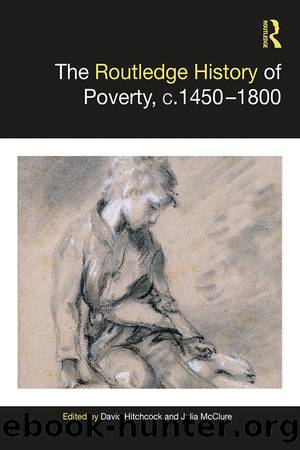The Routledge History of Poverty, c.1450â1800 by David Hitchcock Julia McClure

Author:David Hitchcock, Julia McClure [David Hitchcock, Julia McClure]
Language: eng
Format: epub
ISBN: 9781351370981
Barnesnoble:
Publisher: Taylor & Francis
Published: 2020-12-30T00:00:00+00:00
10
Consumption and material culture of poverty in early-modern Europe, c1450â1800
Joseph Harley
A number of factors have been used to assess and classify poverty, such as income, the ability to pay taxes, family background and being in receipt of state benefits or charity. Perhaps the most visual and contentious measurement is material wealth and consumption. Even today, in an age when smartphones, televisions, holidays and clothing can be bought relatively cheaply, the issue causes controversy and many people have been ostracised for owning anything beyond basic necessities. Some commentators, for instance, recently looked on in shock and disgust as Syrian refugees entered Europe with smartphones, clearly missing the point that handsets are ubiquitous and indispensable for navigation and communication, and that most of the refugees until recently were settled with regular incomes.1 Similar examples can be traced through history. Numerous social commentators argued that the poor were consuming too many unnecessary goods during the eighteenth century, leading to immorality and familial and national ruin. Tea was purchased by poorer households in greater amounts over the period and this was often portrayed in a very negative manner by writers. Poor women were depicted as trying to copy their social superiors, often to the detriment of their husbands and children. In 1745 Simon Mason argued that:
Wives are regaling with their Tea ⦠These poor Creatures, to be fashionable and imitate their Superiors, are neglecting their Spinning, Knitting, &c. spending what their Husbands are labouring hard for; their Children are in Rags, gnawing a brown Crust, while these Gossips are canvassing over the Affairs of the whole Town, making free with the good Name and Reputation of their Superiors ⦠And by these Meetings much Gossiping, Lying, Backbiting, is broached and carried on, and proves often destructive to others more sober and industrious.2
1 Marie Gillespie, Souad Osseiran and Margie Cheesman, âSyrian refugees and the digital passage to Europe: Smartphone infrastructures and affordancesâ, Social Media + Society, special issue âForced Migrants and Digital Connectivityâ (JanuaryâMarch 2018), 1â12.
2 Simon Mason, The good and bad effects of tea considerâd (London: M. Cooper, 1745), 41â2.
Download
This site does not store any files on its server. We only index and link to content provided by other sites. Please contact the content providers to delete copyright contents if any and email us, we'll remove relevant links or contents immediately.
Room 212 by Kate Stewart(5125)
The Crown by Robert Lacey(4817)
Endurance: Shackleton's Incredible Voyage by Alfred Lansing(4785)
The Iron Duke by The Iron Duke(4360)
The Rape of Nanking by Iris Chang(4215)
Joan of Arc by Mary Gordon(4115)
Killing England by Bill O'Reilly(4005)
Say Nothing by Patrick Radden Keefe(3988)
I'll Give You the Sun by Jandy Nelson(3448)
Shadow of Night by Deborah Harkness(3370)
Hitler's Monsters by Eric Kurlander(3343)
Mary, Queen of Scots, and the Murder of Lord Darnley by Alison Weir(3210)
Blood and Sand by Alex Von Tunzelmann(3205)
Eleanor & Park by Rainbow Rowell(3178)
Darkest Hour by Anthony McCarten(3133)
Margaret Thatcher: The Autobiography by Thatcher Margaret(3083)
Book of Life by Deborah Harkness(2939)
Red Famine: Stalin's War on Ukraine by Anne Applebaum(2935)
The One Memory of Flora Banks by Emily Barr(2864)
